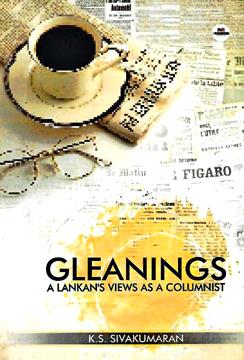
K.S. Sivakumaran is a bilingual (English and Tamil) columnist whose contributions appear in many national newspapers. I had the privilege of working with him at The Island editorial way back in the 1980s. He edited the ‘Culture’ page for many years.
In 22 chapters Sivakumaran writes on Indian literature in English, poetry, Lankan writing in English, English drama, growth of the English language, Manique Gunasekera’s contribution to English, felicity of Jean Arasanayagam’s poetry, Kamala Wijeratne’s poetic sensibilities, Vivimarie’s Borrowed Dust, James Goonewardene’s new book, Professional Editing of Books and Punyakante’s poems.
In the first chapter he draws attention to ‘Illuminati’, a reputed Indian journal. Because of its wide coverage of English literature in India, it is treated as a “Transnational journal of literature, language and cultural studies.” The journal comes with valuable articles on Google translation, machine translation, translating the translator, and satirical deconstruction. They would be useful for those engaged in translations. Unfortunately, only a handful of Tamil works have been translated into Sinhala.
To understand what is written in other languages we need competent translators. As it is humanly impossible to learn all the languages, we can read books translated into our own languages. Some local universities, notably, the Kelaniya and the Sabaragamuwa Universities have launched degree courses in translation methods.
Those who follow these courses are taught many other foreign languages. Hopefully, they would be able to translate English, Tamil, Hindi and French works into Sinhala in the near future.
Chapter six draws the reader’s attention to the prestigious journal Channels edited by Kamala Wijeratne. It regularly publishes contributions from Sri Lankan writers such as, Anne Ranasinghe, Maureen Seneviratne, Prof. Rajiva Wijesinha, Punyakante Wijenaike, Parvathi Arasanayagam and Jean Arasanayagam.
There has always been a debate whether we should use British English or Sri Lankan English. Those who have studied in the English medium would remember W.H. Samaranayake’s path-breaking textbook Practical English. The author has listed a number of Ceylonisms or Sri Lankan English expressions. Prof. Manique Gunasekera in her book The post-colonial identity of Sri Lankan English says, “For generations people have believed and declared that they speak British English or the Queen’s English and these terms are used interchangeably. In keeping with this belief, some Sri Lankans still look to the BBC as the arbiter of correct usage of English. In a post-colonial society, such as ours, this is a supreme example of linguistic servitude.”
I do not subscribe to this view because we have no moral right to change the standard British English. Today even some university teachers promote a funny kind of ‘Sri Lankan English’. Just examine the following expressions of ‘Sri Lankan English’ found in one of the books written by a lecturer: “What is your age?” (Standard English: How old are you?), “What is your aiya’s age?” (Standard English: How old is your elder brother?) When you have to learn a foreign language you have to learn it as it is. When you learn French or German, nobody is going to teach you ‘Sri Lankan French’ or ‘Sri Lankan German’. Therefore ‘Sri Lankan English’ should be dismissed as simply substandard.
The author has devoted three chapters to Jean Arasanayagam, a noted Sri Lankan poet. Her mastery over the language is evident in all her poems. She writes:
“I am always perhaps the protagonist,
Entering under the skin in that invisible camouflage
But my true identity is often concealed in alter egos
Personae in the creation of allegorical fictional plots.”
In the chapter titled, ‘Poetic mind of an intellectual’, Sivakumaran pays a tribute to Regi Siriwardena who was an eminent literary critic and poet. In Elegy for Serena Regi wrote: “It is not your wasted face I want to remember, nor your hands and arms, paired down by death to the bone, but the light of life in your eyes; in them the spirit resisting, the invader to the end, unafraid, alone.”
The author pays a left-handed compliment to James Goonewardene when he says, “It is difficult to review straight the new book by James Goonewardene for two reasons. It is not a conventional novel and it speaks of uninteresting topics in cynical fashion in a language that is copious, digressive and episodic.”
Sivakumaran has not excluded Punyakante Wijenaike who is a celebrated novelist and poet. Her short poem Butterfly has a Keatsian flavour:
“Foolish yellow butterfly,
Chasing your yellow mate and also
Leaving you to make advances,
Kissing a yellow Ranavara bud
While she sunbathes
On a bright green leaf.”
Taken as a whole, Sivakumaran’s Gleanings creates a need in the reader to be familiar with local writers, poets and critics. He has tasted the eternal springs of poetry and invites the reader to follow suit.
